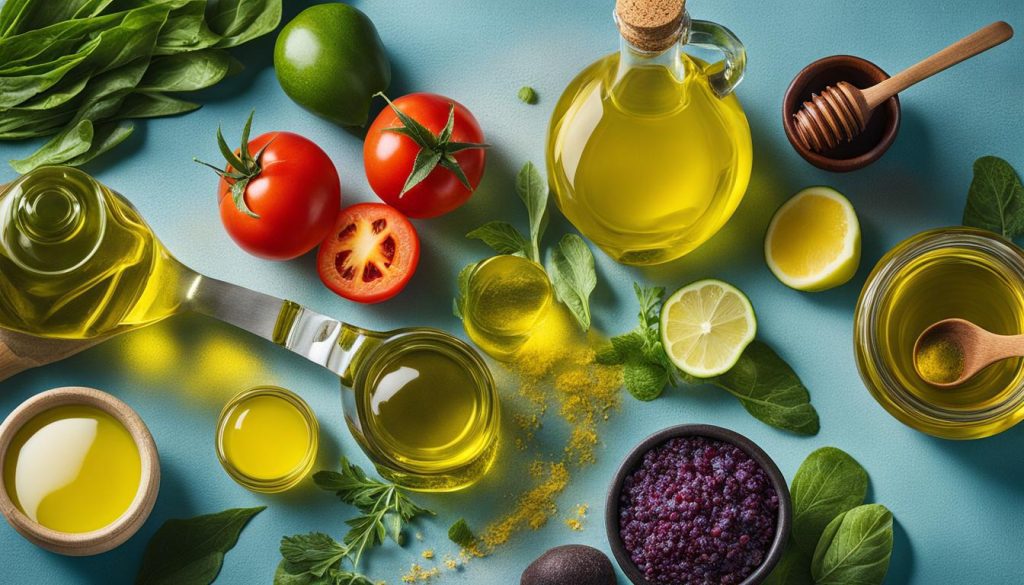When it comes to healthy eating, there is often confusion about what oils are good for us. Vegetable oil, a generic term for oil derived from plant sources, has been a topic of debate. Some believe it is a healthy option, while others argue that certain production processes and over-consumption can lead to health problems.
So, what is the truth about healthy vegetable oils? Are there benefits to including them in our diet? Let’s explore the different types of healthy vegetable oils and discover which ones are best for our health.
The Truth About Healthy Vegetable Oils
- Vegetable oil is a broad term for oil derived from plants.
- There are concerns about over-consumption and certain production processes of vegetable oil.
- Alternatives like olive oil, coconut oil, and avocado oil might provide healthier options.
- The balance of omega-6 and omega-3 fatty acids in your diet is important for optimal health.
- Moderation is key when consuming vegetable oils.
What is Vegetable Oil?
Vegetable oil is a broad term that encompasses various oils derived from plant sources. Common examples include canola, sunflower, corn, soybean, and olive oil. These oils are widely used in cooking and baking due to their versatility and availability.
Olive oil, for instance, is a popular choice known for its rich flavor, which adds a delightful taste to dishes. It is also packed with monounsaturated fats and antioxidants, making it a heart-healthy option.
When it comes to canola oil, it stands out for its low saturated fat content and high levels of monounsaturated fats. Additionally, canola oil contains omega-3 and omega-6 fatty acids that are beneficial for overall health.
Sunflower oil, on the other hand, is recognized for its light color, mild flavor, and high smoke point, making it suitable for high-heat cooking methods such as frying. It is a popular choice in many global cuisines.
While these oils are commonly used, there are also alternative options available. Avocado oil, for example, is gaining popularity due to its high smoke point, mild taste, and potential health benefits. Coconut oil, with its distinct flavor and numerous culinary uses, is another popular alternative to consider.
These vegetable oil alternatives offer unique flavors and nutritional benefits. Experimenting with different oils can add variety to your cooking and help you discover new tastes and textures.
- Vegetable oil is derived from various plant sources such as canola, sunflower, corn, soybean, and olive oil.
- Olive oil is rich in monounsaturated fats and antioxidants, making it a heart-friendly option.
- Canola oil is low in saturated fat and high in monounsaturated fats, as well as omega-3 and omega-6 fatty acids.
- Sunflower oil is known for its light color, mild flavor, and high smoke point.
- Consider alternative options like avocado oil and coconut oil for distinct flavors and potential health benefits.
The Process of Making Vegetable Oil
The process of making vegetable oil involves using physical force and/or chemicals to break down plant tissues and release the oil. This allows the extraction of oil from various plant sources such as canola, sunflower, corn, soybean, and olive oil.
One common process used in vegetable oil production is refining. Refining helps to remove impurities from the oil, making it lighter and able to tolerate high heat.
It also enhances the shelf life and flavor stability of the oil. However, the refining process may strip away some of the natural flavor and nutrients present in the oil.
On the other hand, unrefined vegetable oils are less processed and retain more of their natural flavor and nutrient content. These oils are often labeled as “cold-pressed” or “extra-virgin.”
However, unrefined oils generally have a lower smoke point, which is the temperature at which the oil starts to smoke and break down.
It’s important to choose the right vegetable oil based on its smoke point for different cooking methods. Using an oil with a low smoke point for high-heat cooking can lead to the production of harmful compounds and undesirable flavors.
Oils with higher smoke points, such as canola oil or refined olive oil, are suitable for frying, baking, and other high-temperature cooking techniques.
Understanding the Smoke Point of Vegetable Oils
The smoke point of an oil is the temperature at which it begins to smoke and degrade, leading to the production of toxic compounds. When oil is heated beyond its smoke point, it can not only affect the flavor and nutritional value of the food but also potentially release harmful smoke and fumes into the air.
Here are some common vegetable oils and their approximate smoke points:
- Canola oil: Smoke point of around 400°F (204°C)
- Sunflower oil: Smoke point of around 440°F (227°C)
- Refined olive oil: Smoke point of around 450°F (232°C)
- Avocado oil: Smoke point of around 520°F (271°C)
- Refined coconut oil: Smoke point of around 350°F (177°C)
It’s crucial to consider the smoke point of the vegetable oil you choose based on the cooking method you plan to use. By selecting the right oil with a suitable smoke point, you can ensure safer and more enjoyable cooking experiences while preserving the quality of the oil and the food you prepare.
With an understanding of the process of making vegetable oil and the importance of choosing the right oil based on its smoke point, you can make informed decisions when it comes to cooking with vegetable oils.
Experimenting with different types of oils and being mindful of their smoke points will help you achieve delicious and healthy dishes.
The Health Benefits of Vegetable Oils
When it comes to heart-healthy oils, plant-based oils are an excellent choice. They are not only low in bad fats but also high in essential fatty acids that support overall health.
One of the key advantages of vegetable oils is their nutritional value. Different types of vegetable oils contain various vitamins and minerals that offer unique health benefits. For example, vitamin E and vitamin K, found in vegetable oils, have antioxidant properties and aid in blood clotting.
An additional advantage of certain vegetable oils is the presence of omega-3 fatty acids. These fatty acids play a crucial role in brain health and reducing inflammation in the body. Including omega-3-rich vegetable oils in your diet can contribute to overall well-being.
To harness the health benefits of vegetable oils, it’s important to strike a balance between omega-6 and omega-3 fatty acids consumption. While omega-6 fatty acids are essential, excessive intake can lead to an imbalance and potential health issues.
By incorporating omega-3 fatty acids from vegetable oils, you promote a more balanced and optimal state of health.
The Nutritional Composition of Vegetable Oils
Vegetable oils are packed with beneficial nutrients that support heart health and general well-being. Here is a breakdown of the nutritional composition of vegetable oils:
- Monounsaturated fats: These heart-healthy fats help lower bad cholesterol levels and reduce the risk of heart disease.
- Polyunsaturated fats: These essential fatty acids, including omega-3 and omega-6, are vital for brain function and reducing inflammation in the body.
- Vitamins and Minerals: Different vegetable oils contain various vitamins and minerals, such as vitamin E and vitamin K, providing antioxidant properties and supporting blood clotting.
With their array of nutrients, vegetable oils offer a valuable addition to a balanced diet, contributing to optimal health and wellness.
Adding heart-healthy vegetable oils, rich in beneficial nutrients like omega-3 fatty acids, to your diet can promote well-being and support overall health.
The Global Use of Vegetable Oils
Vegetable oils have become a staple in kitchens worldwide due to their affordability, availability, and perceived health benefits.
They have replaced animal fats in many diets, offering a heart-healthy alternative. However, there is a growing concern regarding the excessive consumption of vegetable oils and the potential health risks associated with it.
When it comes to incorporating vegetable oils into your diet, moderation is key. It is essential to understand the guide to vegetable oil consumption and choose healthy oils for a balanced diet. Opting for cold-pressed vegetable oils is of utmost importance as they retain more nutrients and are less processed.

While vegetable oils have their benefits, it’s crucial to be mindful of the quantity consumed. A balanced diet should consist of a variety of oils, including both plant-based and animal-based options.
By making informed choices and incorporating cold-pressed vegetable oils into your cooking, you can enjoy their benefits while maintaining a healthy lifestyle.
The Controversies Surrounding Vegetable Oils
While vegetable oils have been promoted as a healthier alternative to animal fats, there are controversies surrounding their consumption. It’s important to separate myths from facts and make informed choices about the types and amounts of vegetable oils consumed.
- Myth: Vegetable oils are always healthy.
- Fact: While vegetable oils can be a part of a balanced diet, some studies suggest that a high intake of omega-6 fatty acids found in vegetable oils can disrupt the balance of fatty acids in the body and contribute to inflammation and chronic diseases.
- Myth: Vegetable oils don’t pose any health risks.
- Fact: There are concerns about the potential formation of harmful compounds during cooking or storage of vegetable oils. It’s important to be cautious and avoid overheating or reusing oils to minimize the risk of harmful compound formation.
To make informed choices about vegetable oils, it’s crucial to consider factors such as the type of oil, its nutritional profile, production processes, and individual dietary needs. Moderation and variety in oil selection are key to maintaining a healthy balance.
By understanding the controversies surrounding vegetable oils and dispelling common myths, individuals can navigate the topic more confidently and make informed decisions about incorporating vegetable oils into their diet.
Healthy Alternatives to Vegetable Oils
If you’re looking for healthy alternatives to vegetable oils, there are plenty of options to consider. Olive oil, avocado oil, and coconut oil are all popular choices for cooking and baking.
Olive oil is known for its heart-healthy benefits. It contains monounsaturated fats that can help lower bad cholesterol levels. Additionally, olive oil is rich in antioxidants, which can have anti-inflammatory and anti-cancer properties.
Avocado oil is another excellent choice. It has a high smoke point, making it suitable for various cooking methods like sautéing or stir-frying. Avocado oil is rich in monounsaturated fats and vitamin E, which can contribute to improved heart health and skin health.
Coconut oil is a versatile oil with a distinct sweet flavor. It contains a high proportion of medium-chain triglycerides (MCTs), which are easily digested and provide quick energy. However, it’s important to note that coconut oil is high in saturated fats, so moderation is key.
When choosing healthy cooking oils, it’s important to consider their smoke points. Oils with high smoke points are suitable for frying and high-temperature cooking, as they are less likely to break down and become unhealthy. Olive oil and avocado oil are great options for this purpose.

Conclusion
Understanding the truth about healthy vegetable oils is key to making informed choices about their inclusion in our diets. It is important to debunk myths surrounding vegetable oils and consider their benefits and potential risks.
When consumed in moderation, vegetable oils can be part of a balanced diet. They provide essential fatty acids and valuable vitamins, making them a valuable addition to our cooking and baking routines.
However, it is crucial to be aware of the potential health risks associated with excessive consumption and certain production processes. By choosing high-quality, cold-pressed oils and avoiding overuse, we can incorporate vegetable oils into our meals and achieve a healthier lifestyle.
By understanding the truth about healthy vegetable oils and making informed choices, we can enjoy the benefits while minimizing the risks. So let’s promote a balanced approach and embrace the right type and amount of vegetable oils for our well-being.
FAQ
What are the benefits of vegetable oils?
Vegetable oils provide essential fatty acids and vitamins. They are low in bad fats and high in good fats, such as monounsaturated and polyunsaturated fats. Different vegetable oils offer different nutrients and antioxidants.
What types of vegetable oils are considered healthy?
Olive oil, coconut oil, avocado oil, canola oil, and sunflower oil are commonly considered healthier options due to their nutritional profiles, lower saturated fat content, and high smoke points.
How do I choose the right vegetable oil for cooking?
It’s important to consider the smoke point of the oil, which indicates the temperature at which it starts to break down and produce harmful compounds. Choose an oil with a high smoke point for cooking methods like frying, and opt for cold-pressed options that retain more nutrients.
Are vegetable oils healthy for consumption?
When consumed in moderation and as part of a balanced diet, vegetable oils can be beneficial for heart health and overall well-being. However, there are controversies surrounding their excessive consumption and potential health risks associated with certain production processes.
What are the alternatives to vegetable oils?
Avocado oil, coconut oil, and olive oil are popular alternatives to vegetable oils. These oils are known for their lower saturated fat content, higher levels of beneficial fats and antioxidants, and ability to withstand high heat during cooking.
What are some myths about vegetable oils?
One common myth is that all vegetable oils are unhealthy. The truth is that vegetable oils can be part of a healthy diet when consumed in moderation and as part of a diverse range of oils. Another myth is that vegetable oils are the best source of omega-3 fatty acids, but certain fish and other sources provide higher levels of these essential fatty acids.




